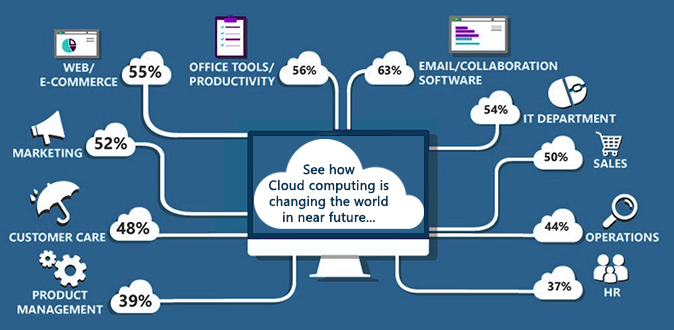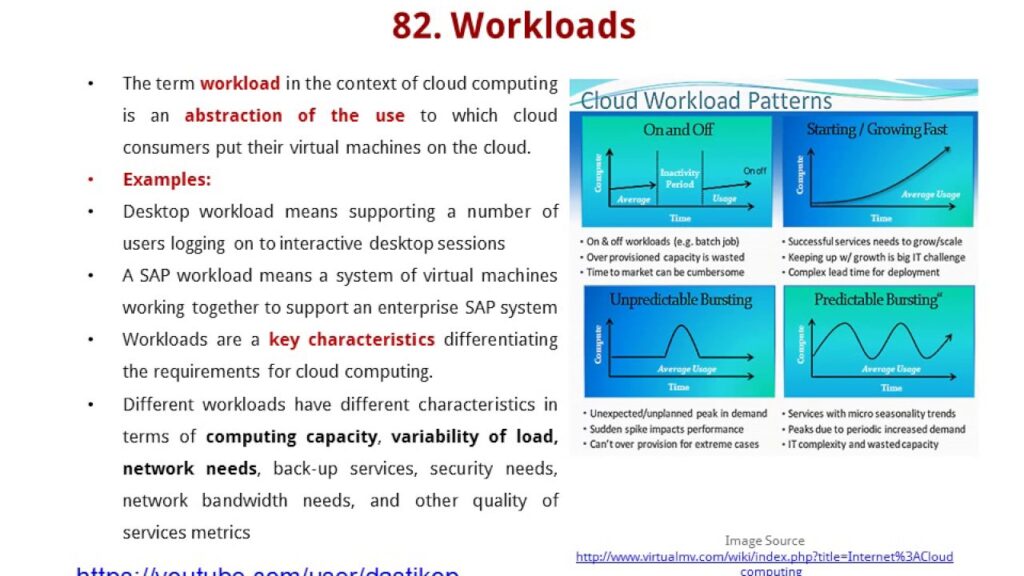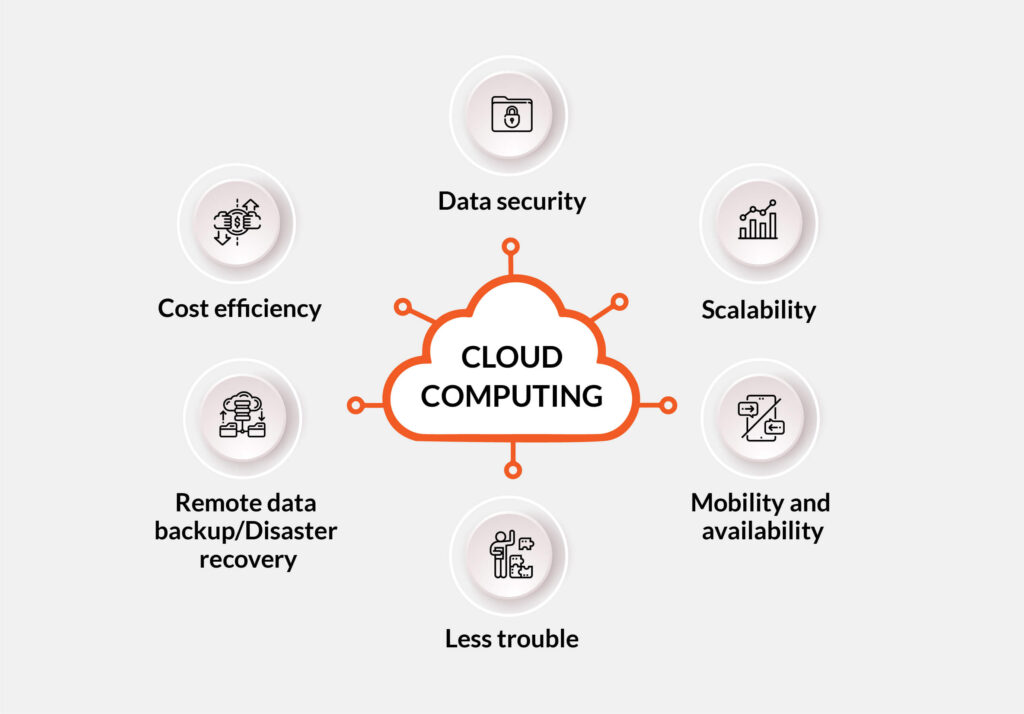In the world of technology, cloud computing has revolutionized the way we use computers. It has changed the way we store and access data, the way we work, and the way we communicate. Cloud computing has become an integral part of modern computing, and its impact has been felt across different sectors. From small businesses to large corporations, everyone is now relying on cloud computing to manage their operations.
The rise of cloud computing has brought about a paradigm shift in the way we approach computing. It has shifted the focus from hardware to software, from ownership to access, and from local to global. With cloud computing, users no longer need to have physical access to their data or software. They can access their applications and data from anywhere, at any time, using any device that has an internet connection. This has made computing more flexible and accessible, and has enabled businesses to operate more efficiently and effectively. In this article, we will explore the ways in which cloud computing has changed modern computing, and how it has transformed the way we work and live.
Cloud computing has revolutionized modern computing in many ways. It has allowed companies to store and access data and applications remotely, meaning that the need for physical servers and computers is largely eliminated. Cloud computing has also enabled businesses to reduce their IT costs by eliminating the need for expensive hardware and software purchases, as well as the need for physical storage space. Additionally, cloud computing provides greater flexibility, scalability, and security for businesses, allowing them to focus on their core operations rather than worrying about IT infrastructure and maintenance.

How has Cloud Computing Changed Modern Computing?
Cloud computing has revolutionized the way that businesses and individuals access, store, and manage their data. By providing users with access to virtualized resources and applications through the Internet, cloud computing has revolutionized how people interact with technology. From small businesses to large corporations, cloud computing has enabled companies to save costs, increase efficiency, and access data from anywhere in the world.
Cost Savings
Cloud computing has enabled businesses to save costs in multiple ways. By eliminating the need to purchase hardware and maintain physical data centers, businesses can save money on their IT infrastructure. Additionally, businesses can reduce the amount of time spent on system administration and maintenance, freeing up resources to focus on their core competencies. Furthermore, cloud computing also removes the need to pay for expensive software licenses, as well as the cost of upgrades and updates.
Cloud computing also allows businesses to pay for only the resources they need, when they need them. This pay-as-you-go model eliminates the need to pay for more resources than what is required, helping businesses save on their IT costs. Additionally, cloud computing also allows businesses to scale quickly and easily without the need for additional hardware, further reducing costs.
Increased Efficiency
Cloud computing has enabled businesses to increase their efficiency in multiple ways. By eliminating the need to maintain physical data centers, businesses can reduce the amount of time spent on system administration and maintenance. Additionally, cloud computing also allows businesses to access data from anywhere in the world, allowing employees to work remotely and collaborate more effectively. Furthermore, cloud computing also allows businesses to deploy applications quickly and easily, enabling them to respond quickly to changing market conditions.
Furthermore, cloud computing also allows businesses to access the latest software and hardware solutions, eliminating the need to purchase and maintain their own hardware and software. Additionally, cloud computing also allows businesses to access advanced computing capabilities, such as machine learning and artificial intelligence, enabling them to develop innovative solutions faster. Finally, cloud computing also allows businesses to access advanced analytics capabilities, allowing them to gain real-time insights into their business operations.
Data Security
Cloud computing has enabled businesses to increase the security of their data. By eliminating the need to maintain physical data centers, businesses can reduce the risk of data breaches. Additionally, cloud computing also allows businesses to access data from anywhere in the world, allowing them to increase the security of their data by using encryption and other security measures. Furthermore, cloud computing also enables businesses to store their data in multiple locations, allowing them to create backups of their data in case of disasters.
Additionally, cloud providers also offer advanced security measures, such as multi-factor authentication and identity management, allowing businesses to control and monitor access to their data. Furthermore, cloud providers also offer many compliance solutions, such as GDPR and HIPAA, enabling businesses to meet their regulatory requirements. Finally, cloud providers also offer advanced analytics and reporting capabilities, allowing businesses to monitor the security of their data in real-time.
Accessibility
Cloud computing has enabled businesses to access data from anywhere in the world. By eliminating the need to maintain physical data centers, businesses can access data from any device connected to the Internet. Additionally, cloud computing also allows businesses to access data from multiple locations, enabling them to collaborate more effectively. Furthermore, cloud computing also allows businesses to access data from different devices, such as smartphones and tablets, allowing them to access their data from anywhere.
Furthermore, cloud computing also allows businesses to access data from multiple users, allowing them to collaborate more effectively. Additionally, cloud computing also allows businesses to access data from multiple devices simultaneously, allowing them to access their data from anywhere. Finally, cloud computing also allows businesses to access data from multiple sources, allowing them to aggregate data from multiple sources and gain insights into their business operations.
Frequently Asked Questions
Cloud computing has revolutionized the way modern computing is done, with businesses of all sizes taking advantage of the technology for improved scalability and cost savings.
What is cloud computing?
Cloud computing is the delivery of computing services—including servers, storage, databases, networking, software, analytics, and more—over the Internet (“the cloud”). Cloud computing enables companies to consume resources as a utility—just like electricity—rather than having to build and maintain computing infrastructures in-house.
Using a cloud provider, businesses can access technology resources on demand, scale up as computing needs increase, and scale down again as demands decrease. This makes businesses more nimble, efficient and able to respond quickly to changing market conditions.
How has cloud computing changed modern computing?
Cloud computing has had a huge impact on modern computing. By using cloud computing, businesses no longer need to invest in their own physical servers, storage, and other IT infrastructure. This means businesses can save costs on hardware, installation and maintenance, and focus their resources on other areas.
Cloud computing also makes it easier for businesses to scale quickly as their needs change. Businesses can spin up new resources in a matter of minutes, rather than days or weeks, allowing them to respond quickly to changing market conditions.
Finally, cloud computing also allows businesses to access the latest technologies without having to invest in the research and development of these technologies. This means businesses can take advantage of the latest innovations, such as machine learning and artificial intelligence, without having to invest in the research and development of these technologies.
What are the benefits of cloud computing?
The main benefit of cloud computing is that it can save businesses money. By using a cloud provider, businesses can access technology resources on demand, scale up as computing needs increase, and scale down again as demands decrease. This makes businesses more nimble, efficient and able to respond quickly to changing market conditions.
In addition, cloud computing also allows businesses to access the latest technologies without having to invest in the research and development of these technologies. This means businesses can take advantage of the latest innovations, such as machine learning and artificial intelligence, without having to invest in the research and development of these technologies.
What are the risks of cloud computing?
When using cloud computing, businesses must be aware of the security risks associated with the technology. As businesses move their data and applications to the cloud, they must ensure that their data is secure and protected from unauthorized access.
Businesses must also be aware of the financial risks associated with cloud computing. The cost of using cloud computing can add up quickly, especially if businesses are not careful in their usage. Additionally, businesses should be aware of the potential for vendor lock-in, which can make it difficult to switch cloud providers if needed.
What is the future of cloud computing?
The future of cloud computing looks very bright. As businesses continue to embrace the technology, cloud computing will become even more ubiquitous. We can expect to see more businesses taking advantage of the scalability, cost savings and speed of cloud computing in the future.
In addition, cloud computing will continue to evolve, with new technologies such as machine learning and artificial intelligence being added to the mix. As these technologies become more common, we can expect to see even more innovation in the cloud computing space.

How Cloud Computing Became a Big Tech Battleground | WSJ
In conclusion, cloud computing has revolutionized the way modern computing functions. The ability to store and access data remotely has not only made computing more efficient but also more flexible, secure, and cost-effective. The cloud has enabled businesses and individuals to access information and applications from anywhere in the world, allowing for increased collaboration and productivity.
Moreover, cloud computing has allowed for the creation of new business models, such as Software as a Service (SaaS) and Platform as a Service (PaaS), which have greatly benefited the software industry. Additionally, the cloud has made it possible for companies to scale their infrastructure and resources to meet the demands of their customers without having to invest in expensive hardware or software. As technology continues to evolve, it is clear that cloud computing will remain an essential component of modern computing and will continue to shape the future of the industry.



